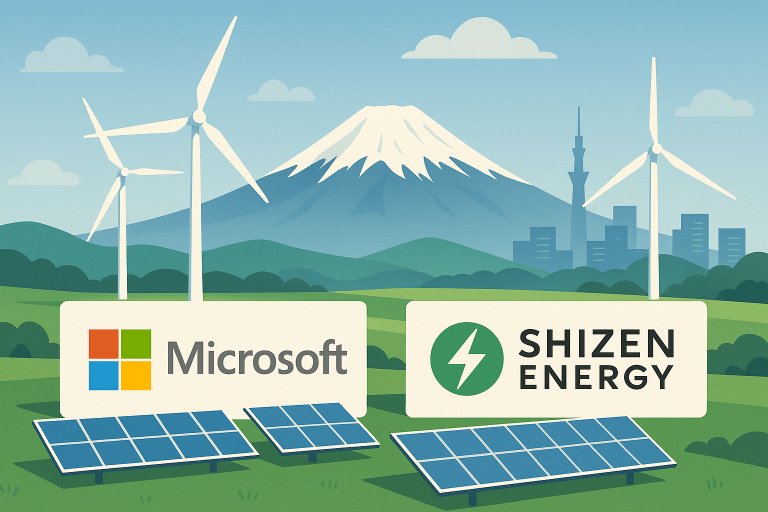Microsoft has expanded its renewable energy commitments in Japan through new agreements with Shizen Energy, adding 100 megawatts of long-term clean power.
The latest batch of contracts includes three solar projects with a duration of 20 years each, two years after the companies first partnered on a similar deal.
These projects, situated in Japan’s Kyushu and Chugoku regions, mark an important step in supporting both Microsoft’s sustainability targets and Japan’s clean energy transition.
The agreements come as demand for corporate power purchase agreements grows rapidly across the Asia-Pacific region, driven by tech firms seeking to cut carbon emissions and stabilise energy needs.
Microsoft adds new solar projects in Japan
The three solar projects tied to the agreements have completed financing and include one site already in operation, while two others remain under construction. They will supply Microsoft with renewable energy for the next two decades.
The deals strengthen Microsoft’s clean power capacity in Japan, where it signed its first long-term contract in 2023, also with Shizen Energy. The total renewable capacity from these partnerships now stands at 100 megawatts.
These additions underline Microsoft’s expanding footprint in Japan’s energy sector, linking technology growth with clean electricity access. The projects are expected to deliver consistent supply despite rising regional energy challenges.
Rising demand for corporate clean energy contracts
Corporate power purchase agreements (PPAs) have become a leading method for companies to secure long-term clean power supplies.
These contracts lock in renewable electricity from providers, reducing reliance on fossil fuels while also creating predictability in costs.
According to Bloomberg, the volume of offsite corporate PPAs in the Asia-Pacific region increased by 51% in 2024, reaching 10.3 gigawatts.
Major technology firms including Microsoft and Amazon are among the largest participants in such agreements as they pursue decarbonisation across global supply chains.
Growth in renewable projects has also been supported by favourable policies encouraging wider adoption.
Microsoft targets carbon-negative status by 2030
The agreements support Microsoft’s wider environmental goals. The company’s sustainability report highlights an 18-fold rise in contracted clean power since 2020. By 2030, Microsoft aims to remove more carbon from the atmosphere than it emits.
The deal with Shizen contributes directly to this target while also aligning with Japan’s broader push for renewable energy in the aftermath of the Fukushima nuclear disaster.
The projects reinforce Microsoft’s commitment to long-term climate initiatives and underline its strategy of using local partnerships to meet its sustainability objectives in multiple markets.
Shizen Energy expands role in global clean power
Founded in 2011, Shizen Energy was created to accelerate renewable energy adoption in Japan after Fukushima. Since then, it has developed 1.2 gigawatts of solar and wind projects worldwide.
The company recently signed another PPA with Google, supplying renewable energy to a data centre in Chiba prefecture. Its collaboration with Microsoft highlights the rising importance of independent renewable developers in meeting global demand for clean power.
Shizen continues to position itself as a key player in Asia’s clean energy growth, supporting both domestic and multinational companies with expanding requirements for sustainable power.
The post Microsoft secures 100MW clean power deal in Japan with Shizen Energy appeared first on Invezz

